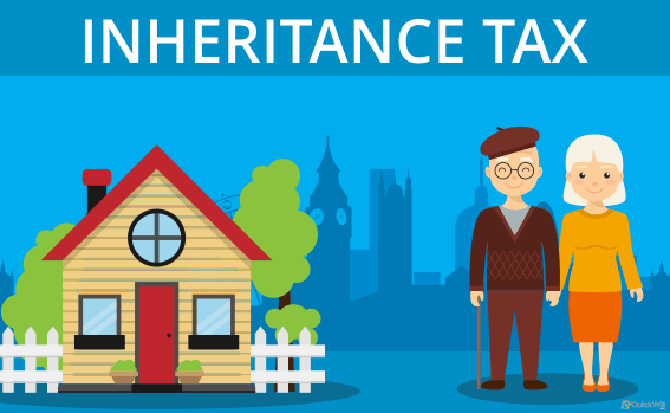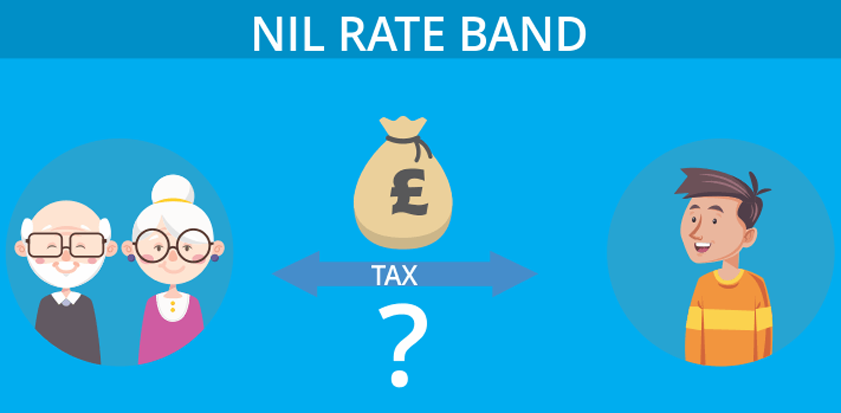Inheritance Tax in the UK is often called the death tax and is due on all of a person’s assets upon their death.
The individual(s) receiving your possessions or a portion of them upon your demise is accountable for the taxes, not you. It is not about the amount inherited by anyone specifically, so it is not possible to successfully bypass Inheritance Tax by dividing up one’s estate among multiple people. Everyone will still need to pay inheritance tax on the portion of an estate that they are granted. This is the way of this tax system.
However, you will only be charged a certain amount of tax if the entirety of the estate surpasses the inheritance tax limit. Inheritance Tax (IHT) is only charged for the portion of the estate that is above the predetermined limit, not the entirety of it.

How Much Inheritance Tax Do I Have To Pay?
Inheritance Tax is one of the least talked about taxes, but it can be one of the most expensive. Knowing how much inheritance tax you may have to pay starts with understanding the regulations around this tax. It also depends upon how much of an inheritance you receive, as there is a threshold over which an estate is subject to inheritance tax payments. In some cases, there may be exemption or deductions allowed for certain types of inheritances.
Due to the tax free threshold not everyone is liable to pay inheritance tax, and in fact the majority of people who die will have their estate valued below the threshold. We deliberately do not put the threshold figure in this article, because the tax free threshold and inheritance tax rates are subject to change every tax year. Tax will only apply if the total of all assets and any acquired wealth exceed the current amount of inheritance tax permitted. Any money you have beyond the threshold amount is subject to a 40% tax at the time of your death, unless it has been gifted to your husband or wife or your same-sex partner.
Everyone has the same basic tax-free allowance before they must pay tax. If the threshold has not been fully used when the first person in a marriage or civil partnership dies, it can be transferred to their surviving spouse or civil partner. There is a procedure to do that which should be followed and the relevant Government forms, typically IHT217 and IHT205 but subject to change, need to be returned to the probate registry office within two years of the death.
When Do I Have To Pay Inheritance Tax?
Most of the time, the standard inheritance tax rate must be paid within half a year after the month of the deceased’s passing. Be mindful that any taxes that are not paid on the due date will be subject to interest fees, regardless of the reason for the delay.
Do not fret if much of the tax debt needs to be endured through the value of an estate, say a home, as HMRC has created a structure where you can pay the amount in segments over a decade. Thankfully, there are procedures available to minimise the possible consequences, such as a massive tax bill, that your heirs could face.
How Can I Reduce My Inheritance Tax?
Use A Trust To Reduce Inheritance Tax
When you put money or property into a trust, provided that certain conditions are met, you will no longer own it. This means that it might not count towards your Inheritance Tax bill after you die.
A trust is a legal arrangement where you give cash, property or investments to someone else so they can look after them for the benefit of a third person. For example, you might put some of your savings aside in a trust for your children.
There are two important roles in any trust:
- Trustee – this is the person or persons or company etc. who will own the assets in the trust. The trustees have the power to buy, sell and invest the assets. The trustees have a legal duty to look after and manage the trust assets for those who will benefit from the trust.
- Beneficiary – this is the person or persons who the trust is set up for. The assets held in trust are placed there for the beneficiary’s benefit.
How Does A Trust Work?
Once assets are put into a trust, provided certain conditions are met, they no longer belong to you.
Instead, the assets belong to the trust. In other words, once it is held in trust, it is not in anyone’s estate for Inheritance Tax purposes.
What Type Of Trusts Are There?
Some trusts are subject to their own Inheritance Tax regime. So when the assets have successfully been transferred into trust, they’re no longer subject to Inheritance Tax on your death.
The kind of trust you choose will depend on many different parameters including what you want it to do. The most common trusts include bare trust, interest in possession trust, accumulation trust, discretionary trust, non-resident trust, vulnerable persons trust and mixed trust, and the scope of what the trust consists of is beyond the scope of this document, suffice to say trusts can be used as a way of minimising inheritance tax and who pays inheritance tax, and it is best to speak to an estate planning specialist who can advise on the best trust to incorporate into your estate plan or Will.
If you need further advice on creating a will with a trust, do contact us.
Set Up A Deed of Variation
The specific trust that works best to reduce the inheritance tax bill after someone has died is called a deed of variation. It’s something that is not often used, and it must be set up within two years of somebody dying.
A deed of variation is a legally binding document that can be used to change the terms of a trust set up in a Will. It is a legal contract that allows beneficiaries in a Will to alter the terms of that Will after the creator of the Will has passed away. Such changes can be made with regards to what assets are included in the trust, who will benefit from it, and how the trust should operate, among other things.
As it alters an agreement made by someone else, all parties involved must agree on the new terms set forth and it must then be registered at HMRC in order for it to become valid under law.
Do bear in mind that deeds of variation are normally expensive to arrange.
Make Gifts
Giving presents is often disregarded, but it is a very helpful strategy for decreasing the total value of your belongings. You are not restricted in the amount of presents that you can give.
Distributing property while you are alive still necessitates prudent monetary management. Calculate the amount you can afford to donate while making sure that you have enough for your own needs.
The amount of inheritance tax saved will be contingent upon the organisation of the gift. There are two categories of presents, referred to as “Potentially Exempt Transfers” and “Chargeable Lifetime Gifts”.
Potentially exempt transfers
Potentially exempt transfers (PET) are gifts that can be made during an individual’s lifetime without incurring any inheritance tax. These transfers are generally considered to be exempt from inheritance tax if you live for seven years after making the transfer. If you die within seven years of making a PET, then inheritance tax might still be due on the transfer.
With a PET you give an outright present, meaning that you are not placing money into a trust. You are able to give away an indefinite amount of gifts without incurring a current inheritance tax.
If the gift you made survives for seven years, there won’t be any liability for inheritance tax; it will have passed out of your estate. If you pass away within seven years, then the gift you gave will be considered as part of your estate and will be subject to inheritance tax. The size of the inheritance subject to taxation will depend on when the gift was presented. If the inheritance was received within the past three years, the entire sum is subject to the inheritance tax. If the gift was given between three and seven years ago, then only a portion of it is liable for inheritance tax. The term taper relief applies here.
Although PETs provide an effective way to reduce one’s potential liability for inheritance tax, due diligence must still be taken to ensure that the gift is a legitimate PET and is not subject to any further taxation.
Chargeable lifetime gifts
Chargeable Lifetime Gifts are any taxable gifts made by an individual in respect of inheritance tax. This includes money, property and even household items of greater value. These gifts must be made within the boundaries of the individual’s lifetime, meaning they are not eligible for any inheritance tax allowances unless they are made within seven years prior to death. Any estate that comprises of such gifts is likely to be subject to Inheritance Tax as this tax is intended to deter individuals from gifting substantial amount of wealth before their death. It is therefore important to understand how this type of gift can affect your beneficiaries’ inheritance prospects and use them with care.
Use Your Allowances
There are a variety of diverse forms of deductions, exemptions and credits that can decrease your burden for inheritance tax. This comprises of the allowance given where no tax is due, the allowance given to those residing in certain places with no tax owed, and the allowance to give a yearly gift without owing taxes.
What is the nil rate band?
The initial amount below the threshold that is exempt from inheritance tax is often referred to as the “nil rate band” or the “inheritance tax limit.” It is a tax-free allowance available for everyone.

What is the residential nil rate band?
The residential nil rate band (RNRB) also known as the residence nil rate band is an expansion of the tax-free allowance. This gives you an extra sum of money that is untaxed, but it must be used to pay off your home and given to your direct offspring (children or grandchildren).
If you pass away and leave your primary residence to your partner, it will be exempt from the nil rate band tax.

Use Your Exemptions
Certain gifts are exempt from inheritance tax altogether. These include any gifts you provide to your partner during your lifetime or after your death (if they live in the United Kingdom). Married couples thus have multiple options for tax-planning.
Annual exemption
It is permissible to present someone with a substantial gift in a single financial year without incurring inheritance tax. If you have not taken advantage of this allowance, you can transfer it to the next year, and if you are married, you can get twice the amount of the allowance on a per-person basis.
Wedding gifts
Offering money presents to newly married couples is a popular method of avoiding inheritance taxes. The amount of taxes that are exempt from payment depends on the relationship between the person donating and the individuals receiving the present.
Parents and step-parents can give more than grandparents and other relatives and friends. These presents must be presented on or near the date of the marriage.
Small gifts
It is possible to give away as much as desired in smaller presents without having to worry about any death taxes related to one’s inheritance. The stipulation is that no portion of a bigger present can be used as the gift.
Gifts to charities in your Will
You have no restriction on how much you can give away to charitable organisations or political organisations.
Inheritance tax can be a major concern when it comes to planning for the disposition of one’s estate. Fortunately, leaving money to charity in a Will can provide substantial inheritance tax benefits, allowing you to make sure your legacy is passed on to the causes you care about most. Charitable contributions within Wills are not subject to inheritance taxes.
Making sure to leave something behind for those in need through charitable donations can both greatly reduce the worry of inheritance taxes and ensure that the charity’s great works continue into perpetuity.
Leaving a portion of your estate to a charity of your choice in your Will can often make a lot of sense. It will reduce the inheritance tax rate to 36%, if at least 10% of the entirety of your estate is given to a charity.
Use Business Relief
Certain kinds of companies and financial investments can qualify for “Business Relief” which grants the possibility of transferring some or every asset without paying any tax.
Business Relief, formerly called Business Property Relief, is applicable to certain types of businesses and investments.
In order to be eligible for Business Relief, the person who passed away must have held possession of the appropriate belongings for a period of at least two years within a span of the five years leading up to the time of their death.
Investments and Business Relief
There are financial options available which permit participating in a business activity that meets the criteria for Business Relief. This could be beneficial if you plan to maintain authority over the goods bought (if you may have to sell in the future) and also work toward meeting the qualifications for full exemption from Inheritance Tax. These plans enable you to accept Inheritance Tax alleviation after a period of two years, as opposed to needing to wait seven years in case you make a contribution.
It is generally a good idea to consult a regulated financial adviser before putting your money into investments that have a greater degree of risk associated with them. The tax incentives presented may be very appealing, however it is essential to ascertain if you are capable of managing the associated risks.
Use Life Insurance
If you pass away with a life insurance plan, the people that are designated as your beneficiaries will typically receive a monetary sum. If you have not transferred ownership of the asset to a trust, inheritance tax will most likely be payable.
You should consider having your life insurance policy written as a trust to make sure it is not part of your estate and avoid any taxes related to inheritance. If the procedure is implemented properly, the final outcome is that your heirs will receive the proceeds of your life insurance policy unencumbered by taxes.
Use Trusts
A trust is effectively a separate legal entity. If assets are put into a trust and meet the necessary qualifications, they will no longer be in your possession. The assets held in trust will not be taken into account when determining the amount of inheritance tax owed. However, the seven year rule will still apply.
A trust can be employed as a more advanced method to decrease your inheritance tax burden. Depending on the kind of trust, it will allow you to maintain some say in how the funds are managed and who reaps the rewards. It is important to bear in mind that trusts may come with their own tax charges and expenses, and the relief from inheritance tax may not be beneficial in all cases.
It is advisable to speak to an unbiased financial expert before establishing a trust. They can give you recommendations regarding the correct kind of trust that fits your requirements and which is the most beneficial for reducing inheritance tax and keeping other taxes and expenses as low as possible.
Invest Tax Efficiently
You can invest in certain businesses that meet the criteria for government incentives. These businesses consist of private companies which you can purchase shares in. If these shares are kept for a period of two years, the worth of these shares upon your death will meet the requirements for business relief, thus making them free from being taxed for inheritance.
Gaining Business Relief can be achieved through an array of different investments, referred to as an AIM portfolio. This service offers investors an accumulation of stocks that are listed on the AIM index.
Along with the advantages from the IHT relief, investing in an AIM portfolio could result in capital appreciation and dividend payments. Any income or capital gain earned from investments will be part of your estate for inheritance tax computation.
Gift and loan trusts should be considered too – and this is where a trust plan involving both donations and loans can be used as an adjustable strategy for reducing inheritance taxation. There will almost certainly be a need to pay iht but reducing any tax bill is part of the strategy. It gives you a consistent and continuous flow of money while gradually decreasing the size of your property. As before, it’s best to contact a financial adviser about such matters.
Conclusion
All in all, inheritance tax is something that needs to be considered carefully. Those with a large estate in particular should consult with a financial advisor regarding their personal circumstances. Not planning properly will mean more tax will need to be paid. Considering this and planning appropriately can help people achieve their goal of minimising the effect of inheritance tax on their legacies.
